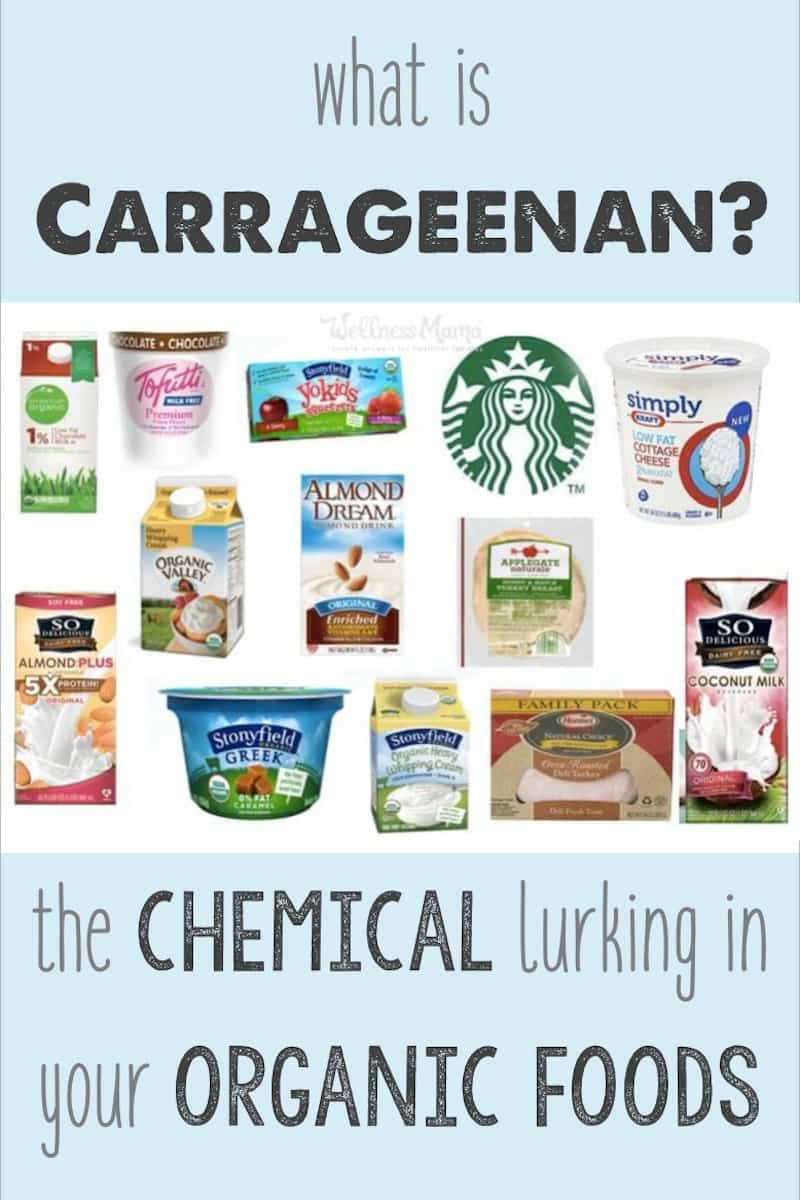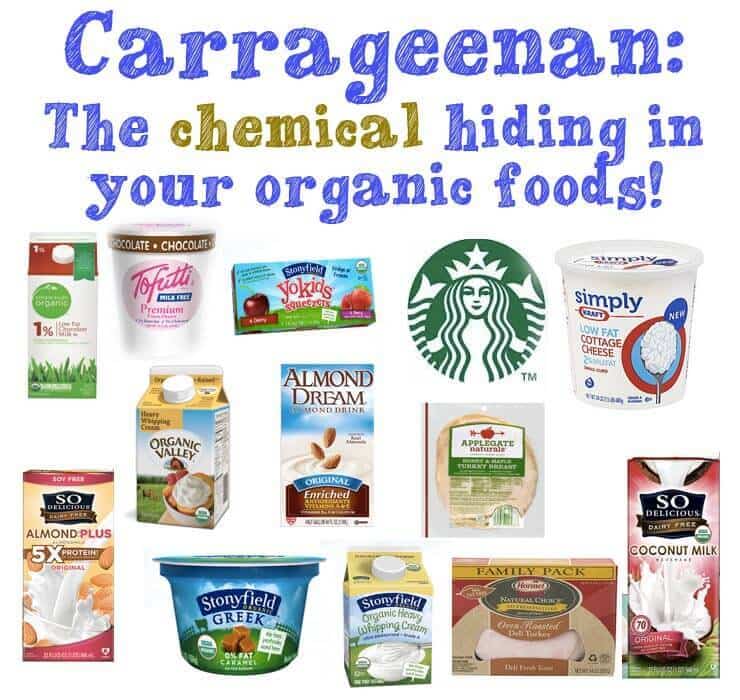Become a VIP member!
Get access to my VIP newsletter with health tips, special deals, my free ebook on Seven Small Easy Habits and so much more!
Reading Time: 4 minutes
This post contains affiliate links.
Read my affiliate policy.
If you’ve ever purchased store-bought almond or coconut milk, you may have noticed an ingredient called Carrageenan on the carton. This hard-to-pronounce little food additive is the reason I make my own homemade almond milk and homemade coconut milk, but it seems that there is a lot of confusion when it comes to this little known ingredient.
According to the Google:
Carrageenans or carrageenins are a family of linear sulfated polysaccharides that are extracted from red edible seaweeds. They are widely used in the food industry, for their gelling, thickening, and stabilizing properties.
Edible seaweeds, like kelp and Nori, right?
Not so much…
It is important to note that Carrageenan is not digestible and has no nutritional value. It is often used because it thickens and emulsifies products and it is often found even in organic and “natural” products.
It may seem that a simple product derived from seaweed should be non-menacing, and I wish it were. This article explains some of the potential problems:
Although derived from a natural source, it appears to be particularly destructive to the digestive system, triggering an immune response similar to that your body has when invaded by pathogens like Salmonella. The result: “It predictably causes inflammation, which can lead to ulcerations and bleeding,” explains veteran researcher Joanne Tobacman, MD, associate professor of clinical medicine at the University of Illinois School of Medicine at Chicago. She says the food ingredient irritates by activating an immune response that dials up inflammation. Her previous work showed a concerning connection between carrageenan and gastrointestinal cancer in lab animals, and she’s involved with ongoing research funded through the National Institutes of Health that is investigating carrageenan’s effect on ulcerative colitis and other diseases like diabetes.
The concern over food-grade carrageenan isn’t new. Beginning in the 1960s, researchers started linking the ingredient to gastrointestinal disease in lab animals, including ulcerative colitis, intestinal lesions, and colon cancer.
Joanne K. Tobacman, M.D., associate professor of clinical medicine at the University of Illinois College of Medicine is one of the leading researchers in the field of digestive health sheds some interesting light on the topic:
Dr. Tobacman said that her research has shown that exposure causes inflammation and that when we consume processed foods containing it, we ingest enough to cause inflammation in our bodies. She explained that all forms of carrageenan are capable of causing inflammation. This is bad news. We know that chronic inflammation is a root cause of many serious diseases including heart disease, Alzheimer’s and Parkinson’s diseases, and cancer.
Dr. Tobacman also told the board that in the past, drug investigators actually used carrageenan to cause inflammation in tissues in order to test the anti-inflammatory properties of new drugs. And she reported further that when laboratory mice are exposed to low concentrations of carrageenan for 18 days, they develop “profound” glucose intolerance and impaired insulin action, both of which can lead to diabetes.
To make things slightly more complicated, there are two forms: degraded and undegraded carrageenan. Technically, undegraded is approved for use in food, while degraded is not.
Degraded carrageenan is also called poligeenan. Chris Kresser looked more closely at the research, and found that many of the animal studies are done using poligeenan and not undegraded carrageenan, which further muddies the water.
Kresser makes this important distinction:
One important difference is that while poligeenan can cause cancer on its own when given in high enough concentrations, undegraded carrageenan has only ever been shown to accelerate cancer formation when administered with a known carcinogen. In other words, food-grade carrageenan has not been shown to cause cancer in animal models. That doesn’t necessarily mean it is is in the clear when it comes to cancer, but contrary to popular belief, it is not a known carcinogen.
When we separate the research on poligeenan and undegraded carrageenan, we find that it is still linked to increased intestinal permeability (leaky gut), intestinal irritation, and colon ulcers. Limited human studies showed an increase in inflammation and cell arrest.
When you start reading labels, you’ll be amazed at the number of products that contain carrageenan! Most infant formulas do, as well as most store-bought milk alternatives. Many creams, creamers and dairy products also contain carrageenan.
I recommend checking out this shopping guide for avoiding foods with Carrageenan.
Our solution is to find carrageenan free store-bought products, or save money by making our own. If you’ve been consuming store bought almond or coconut milk that contains this additive, consider using these recipes and making your own:
Almond Milk Recipe
Coconut Milk Recipe
It may not be as bad as some sources portray, but there is evidence that it can be harmful, especially if consumed regularly.
Many people report reacting negatively with symptoms like digestive troubles, skin rashes, and other health problems.
The research is shaky on if it is a carcinogen or not, but I’m yet to see any research touting its health benefits. Our family avoids it for this reason, especially as it is just used for thickening products and does not serve a nutritional purpose.
Have you ever consumed a food with carrageenan? Did I miss any foods that contain it? Leave a comment below with foods you’ve found that contain it and that we should watch out for…
This article was medically reviewed by Dr. Scott Soerries, MD, Family Physician and Medical Director of SteadyMD. As always, this is not personal medical advice and we recommend that you talk with your doctor.
Become a VIP member!
Get access to my VIP newsletter with health tips, special deals, my free ebook on Seven Small Easy Habits and so much more!
Katie Wells, CTNC, MCHC, Founder of Wellness Mama and Co-founder of Wellnesse, has a background in research, journalism, and nutrition. As a mom of six, she turned to research and took health into her own hands to find answers to her health problems. WellnessMama.com is the culmination of her thousands of hours of research and all posts are medically reviewed and verified by the Wellness Mama research team. Katie is also the author of the bestselling books The Wellness Mama Cookbook and The Wellness Mama 5-Step Lifestyle Detox.
Carageenan is in Nestle Quik chocolate milk mix (powder) and Carnation’s Condensed Milk. Nestle does not show it on the ingredients label.
I recently purchased Culinaria Black Raspberry Chunk ice cream. It took 2 different servings for me to begin to wonder if there was an ingredient in it that I was intolerant to. I ended up with bad stomach cramping, gas, and diarrhea within 20 minutes of eating it. I had 3rd serving and again in the bathroom almost directly afterward. After the 4th very small serving and in the bathroom right afterwards I finally decided to check ice cream ingredients. I researched and discovered it is the carrageenan ingredient that is the problem. It was the first time I had purchased this brand. I am also very intolerant to msg as well. Looks like my list of intolerant ingredients in foods are increasing.
I specifically read the ingredients on the Kozy brand chocolate pudding before buying yesterday. I saw carageenan as a last ingredient, I stood there in front of the cooler to google the ingredient I’d never heard of before and google said it from the red kelp family, all natural and been around since the 50’s. That made me feel fine about buying the chocolate pudding to indulge my sweet tooth. Then, ironically, last night I see the ingredient listed on the “no” list by someone one on instagram. ?
Wow, decided to research this after reading, “Natural Cures, they don’t want you to know about”. As am now more aware of how bad alot of our food it. Needed cream for a recipe so found this page. Thank you!!!
I avoid carrageenan…to say it doesn’t agree with me is putting it mildly. Two scoops of ice cream containing carrageenan tonight will leave me suffering with intense intestinal cramping, diarrhea, and vomiting for several hours the next day. What’s sad is this stuff is popping up in foods that never used to contain it…ice cream, cottage cheese, chocolate bars, and snack cakes. (Yes, I indulge my sweet tooth now and then. No apologies.) French vanilla cappuccino, breakfast pizza, and several bakery items sold at one of the local convenience stores also have carrageenan in their lists of ingredients. What did food maker’s use before carrageenan? Surely, there must be a safer, (and less painful) alternative…
I figured out that carrageenen caused me intensional distress. Sometimes violent reactions. It’s amazing how many items have it on them such as dressings or sour creams and ice creams. It’s unfortunate that childrens protein shakes and formulas do as well which we learned in a rough way when my 2 year old had a violent reaction as well.
I just checked my oat milks, coconut milks and yogurts. They all say NO carrageenan added.
Eeeek! It’s often the secondary ingredient in vegetarian capsules! So the whole reason I came across this article was in comparing the different ingredients in veg capsules. I had heard about carrageenan but didn’t know much about it. Seems like there’s plenty of debate but the potential risks still SHOCKING!!
Carageenan is often now added (injected) to meats…butchered meats like chicken thighs, things you might not expect are processed or have ingredients other than just meat. Carageenan helps the meat retain liquid, unsure if that’s to keep the weight high by pound for sale, or just to keep the blood from running out and being messy and spreading bacteria.
Also look for it in puddings, yogurt, really any dairy product might have it, and the non dairy version also. Ice creams, including bars.
Soaps.
I’ve also heard it may be sprayed on cut or scrubbed or other processed fresh produce, like baby carrots. That would make sense again to retain moisture and keep the tender produce shelf stable longer.
I have a been making a delicious vegan mozzarella cheese because I am trying to give up dairy. The recipe calls for kappa carageenan or agar powder. I have been using gelatin, but the consistency is not right. Agar is also made from red algae. I can’t seem to find anything negative about it and one website even said it reduces inflammation. Does anyone know if there are any studies on agar that have worrisome results?
I was told by a chef friend that certain Genus and species of Red Algea produce Carageenan. I make my medical gummies with Agar which is a different genus than the carageenan algeas. Gracillaria is the Genus in my agar. Which supposedly does not produce Carageenan. So far I am okay. However, the Irish Moss used in Beer and wine for clarification is NOT okay. Craft beer brewers and smaller vineyards use carageenan for clarification rather than centrifugal methods. I have Alpha gal and high sensitivity to carageenan. My favorite brewer has Alpha gal too. He said Hazy IPA’s typically don’t use Irish Moss(Carageenan).
Your email address will not be published.
The information on this website has not been evaluated by the FDA and is not intended to diagnose, treat, prevent, or cure any disease. By accessing or using this website, you agree to abide by the Terms of Service, Full Disclaimer, Privacy Policy, Affiliate Disclosure, and Comment Policy. Content may not be reproduced in any form. Ads provided by CafeMedia Family & Parenting Network. Displayed ads do not constitute endorsement or recommendation by Wellness Mama.
Get access to my VIP newsletter, special deals and three bonuses, including a 1-week real food meal plan!
No spam, ever.
Copyright © 2024 · Wellness Mama® · All Rights Reserved · Powered by WP Engine
source
